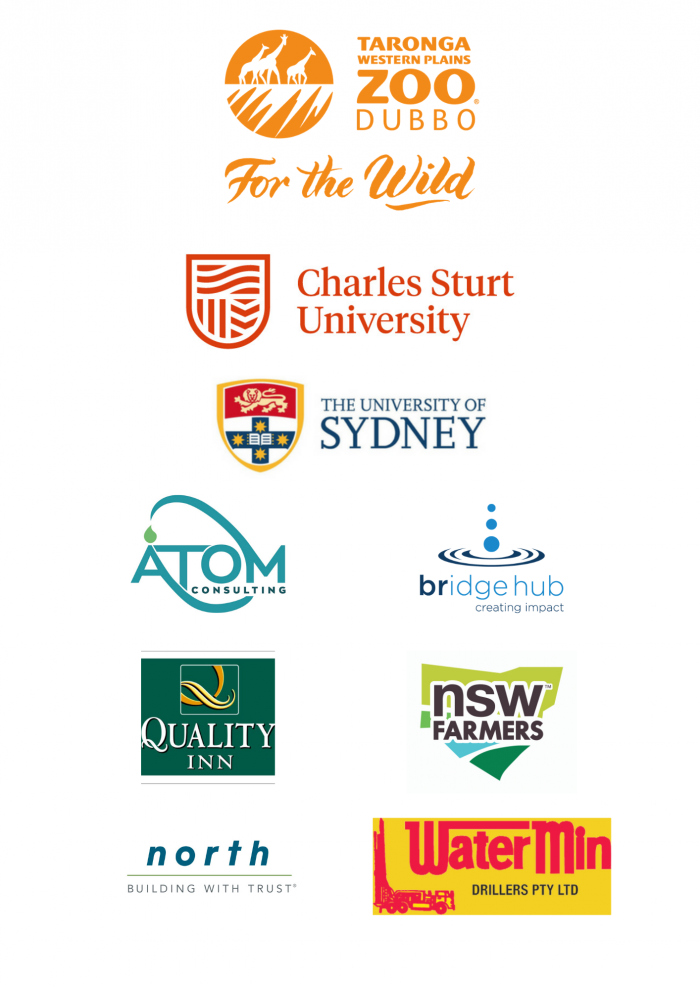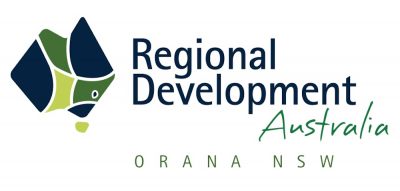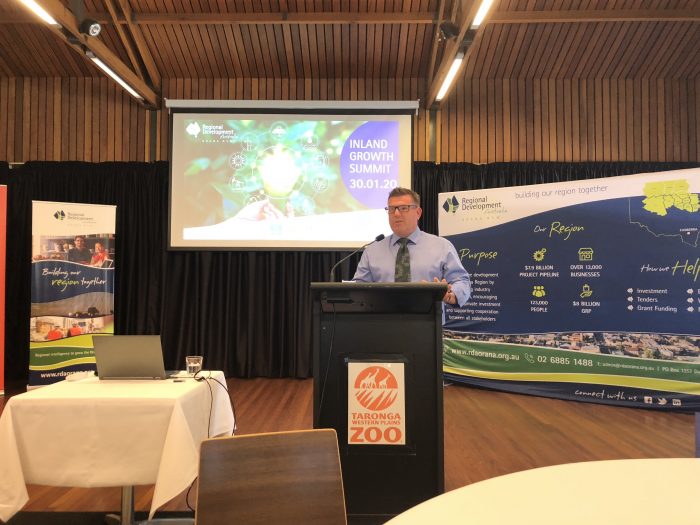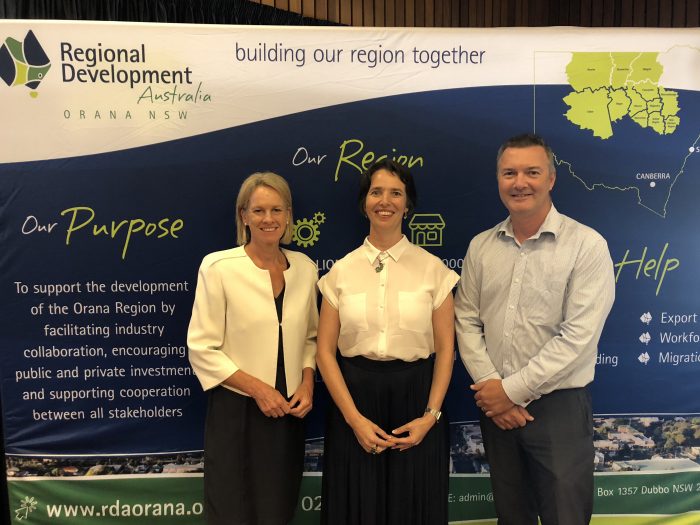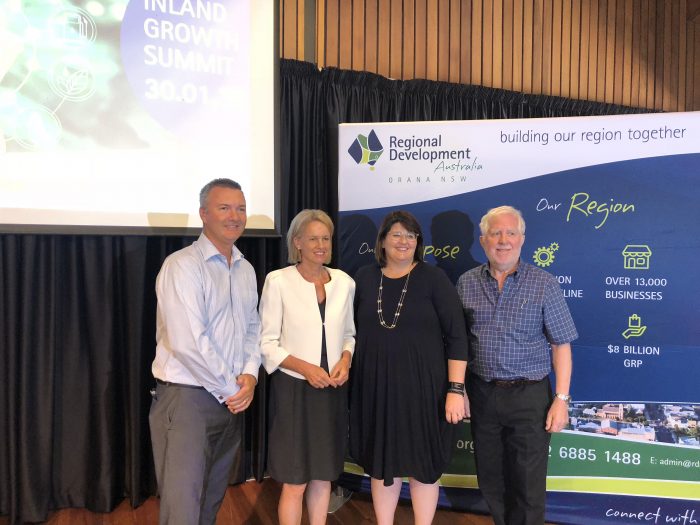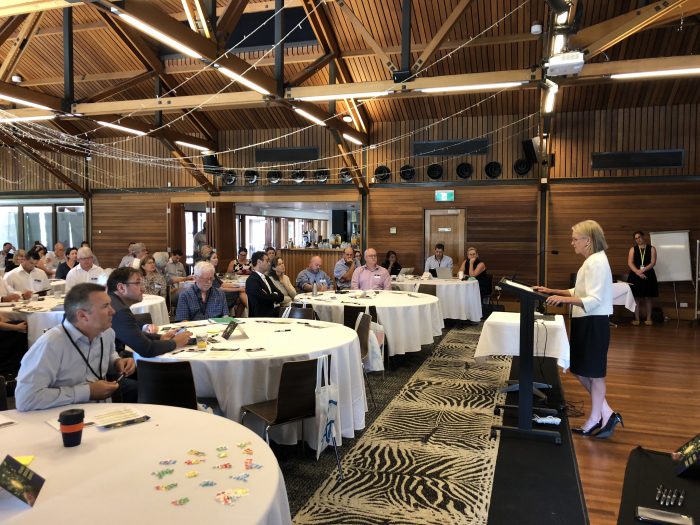On the 30th Of January 2020, RDA Orana hosted the second annual Inland Growth Summit.
The 2020 theme was all about the future of water, the opportunities and innovative techniques that are occurring around us in terms of water management, reuse innovation and change management.
Acting RDA Orana Chairwomen Tracy McIntyre welcomed attendees on the day and introduced the masters of ceremonies hon. Fiona Nash Strategic Adviser – Regional Engagement for Charles Sturt University.
Session 1 – Strategic
Dr Geoff Beeson Honorary Professor for Deakin University was the keynote speaker and set the context for the day ahead. Touching on over 65,000 years of practised sustainable water management.
Dr Beeson acknowledged how Aboriginal Australians have developed and improved the knowledge of environment and water sources over a period of time and passed it through the generations.
Also highlight signification innovations from ancient Rome introducing aqua ducts, the age of the Dam, the introduction of the Dethridge wheel measuring the flow of water onto farms and more recently the development of the national water commission, desalination and recycling wastewater.
Dr Beeson’s suggestions for the future include long-term planning; clear and consistent policies from a national, state and local level, recycling wastewater; indirect potable reuse and greater efficiency from existing suppliers.
Dr Beeson’s book A Water Story: learning from the Past, Planning for the Future is now available.
Download Dr Beeson’s presentation HERE.
The Hon Mark Coulton MP, Minister for Regional Services, Decentralisation and Local Government, Assistant Trade and Investment Minister and Member for Parkes was the second speaker for the Strategic session. Mentioning the workforce needs in agriculture and mining once the drought breaks, along with the importance of having government representatives serving the people locally not from an office in Canberra or Sydney.
The Minister also praised the local community for being ahead of the climate change trend and implementing carbon offsetting activities including having the largest renewable energy production than any other electorate. Minister Coulton concluded his presentation with the idea that in order to grow inland Australia, we need to change the narrative, and produce more positive news stories.
Session 2 – Water for Business
Xavier Martin, Chair of the NSW Farmers Water Taskforce was the first speaker for the Water for Business session. Touching on the challenges facing the agricultural industry in NSW particularly in relation to the current water conditions and drought. He pointed out the need for live monitoring of data as real-time data allows for better management of the water systems.
He called for a review of the Murray Darling Basin Plan since it was not well thought out and planned to fit the various amount of water needs. Also mentioning how the water taskforce are actively pursuing better water management including advocating for new policy responses needed for more water elasticity for both productivity and environment processes.
Willem Vriesendorp, General Manager for Clean TeQ Water was the second speaker for the Business Session, discussing the technology that Clean TeQ Water are using to process minerals/ clean water. With Clean TeQ trying to stay away from more standard water treatment plants, the founder is using technology out of Russia.
The main technologies that Willem discussed included CIF (Continuous Ionic Filtration) which enables contaminants in water to be removed using a combination of physical and ionic filtration. As well as Advanced membrane systems for filtration of waters and wastewaters. These circumstances typically include where the water quality is predictable, scaling and fouling potential is managed by pre-treatment.
Willem additionally argued that there is not a shortage of water in the world but a shortage in the distribution of water. Substantial shortages often occur in developed regions because of long term planning horizons and weather variability.
Download Willem’s presentation HERE.
Steve Hinks Director of Taronga Western Plains Zoo was the third speaker for the Business session discussing the importance of tourism for regional Australia, and the future plans for the zoo to reduce water containment. Steve mentioned that tourism injects over $300m of revenue into the Dubbo economy each year, and that tourism has one of the highest impact multiples of money (IMM) of the many drought and disaster relief strategies.
Steve also touched on changing the narrative, because with every beautiful marketing ad that goes out, it only takes one bad story of no water or the like to turn visitors around. For the future Steve is passionate about removing plastic straws from Dubbo, analysing community impact and more engagement and developing industry partnerships.
Download Steve’s presentation HERE.
Karin Stark was a 2019 NSW-ACT Agrifuture’s Rural Women’s Award Finalist for her work convening the National Renewables in Agriculture Conference. Karin discussed the 500kW solar-diesel hybrid pumping system installed on her cotton farm in Narromine in 2018. 78% of farmers claim they don’t have control over their energy costs, Karin also identified barriers to adoption of renewables on farm including lack of understanding about feasibility, lack of trust in supplies, high capital costs, and scarcity of examples to learn from.
The system that was installed on Karin’s property in 2018, is the largest system of its type in Australia and is reducing 500 tonnes of co2 production each year, equivalent to approximately 40 households. Karin will be hosting the second National Renewables in Agriculture Conference in Dubbo later in 2020.
Download Karin’s presentation HERE.
Session 3 – Innovation
Craig Shapiro Co-Founder of the Bridge Hub was the first speaker for the Innovation session, discussing the work of the Bridge Hub. Craig highlight that although drought is a very tough period, it is also an opportunity to shift the dial.
He also discussed that the Bridge Hub is a research solution looking for a problem, it is a launchpad looking to find the best Australian research and entrepreneurial ideas to partner with. This includes coming up with solutions that will have a global impact and brining technologies from around the world to test and trial here in Australia. With the result of drought-proofing our agrisystem so we can be a much more productive and better nation.
Download Craig’s presentation HERE.
Dr Martijn de Sterke Professor at the University of Sydney was the second speaker for the Innovation Session and discussed his current research in water capture, advance capture of water from the atmosphere or developing technology to collect water from the atmosphere without energy input.
Touching on where we currently source our water including conventional sources (rain and rivers), desalination and conservation and recycling. Dr de Sterke discussed the capture methods of fog or dew as an alternative source, particularly in Chile and Canada where they are currently setting up giant spider web-like dew catchers. Dr de Sterke also discussed whether we can harvest water even in the absence of fog or clouds with water evaporation, and condensation.
Download Dr de Sterke’s presentation HERE.
Session 4 – Water for Community
Mayor of Orange City Council, Reg Kidd was the first speaker for the Water for Community session. With Orange being one of the only inland cities that does not sit on a river, the council has been proactive about water sustainability for a very long period. The Orange community currently only use 127L of water per person per day and are trying to avoid level 6 water restrictions. Reg also discussed the stormwater harvesting that Orange Council have been undertaking since 2009, and the importance of educating community and business on alternative sources of water.
Download Reg’s presentation HERE.
Dr Annalisa Contos, Principal of Atom Consulting presentation was themed on water for life for the future. With the recognition of global warming and rainfall 40% below average in 2019, the challenge is that there is no clear path.
Discussing how the urban water sector has changed over the decades from productivity and efficiency focus on the 1980s to a shift towards water security and demand management in the 2000s. Dr Contos suggested that more engagement needs to be made with local communities to understand how to unlock the full value to environment and health benefits for water in the community.
As the solution to solving every water challenge involves the evaluation of all water sources, all end users, solutions that are fit for purpose and outcomes that are fit for a communities needs. For the future Dr Contos suggested that funding needs to include water infrastructure as social infrastructure not just essential service and unlocking the shared value of water is paramount for communities.
Download Dr Contos’ presentation HERE.
Professor Ross Thompson from the University of Canberra was the final speaker for the day. As a co-leader of the basin-wide program monitoring the effectiveness of environmental flows in the Murray Darling, Ross discussed the series of audits across the basin in the 2000s and States not meeting their compliance needs.
He suggested for the next generation of water reform, transparency, accountability and certainty need to be the themes. Ross’s presentation also included understanding what environmental water does when it is delivered to the environment including the indigenous values and water; healthy people, healthy culture, healthy country.
Ross concluded stating the next generation of water reform is almost upon us and in order to ensure transparency, accountability and certainty all parties must be present at the table, there must be clear processes around water allocations to all parties and there must be enforcement of these.
Download Ross’s presentation HERE.
WORKSHOP
The final part of the day was a workshop co-hosted by The Bridge Hub and RDA Orana. Throughout the day challenged questions had been asked to attendees with requests on problems that need to be solved, the final workshop saw attendees vote on which problems, that if solved, would have the greatest impact. This activity yielded the following top problems:
- Inability to see real-time water quality or quantity across the entire system
- Contamination of water before and after agrisystems use
- Lack of wastewater reuse
- Lack of water retention in the landscape
- Lack of understanding and availability of drought-resilient high-value crops
- Poor water runoff management
- No national vision for water efficiency
- Work in industry verticals rather than issue horizontals
This information will help the Bridge Hub build out four Challenge Statements for their 2020 Water Challenge.
SPECIAL THANKS TO OUR SPONSORS
